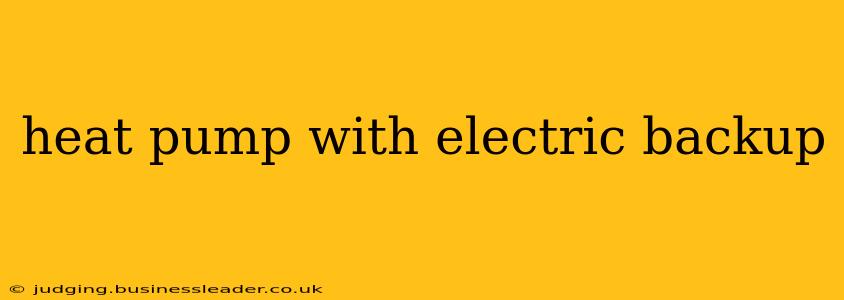A heat pump is an increasingly popular choice for home heating and cooling, offering energy efficiency and environmental friendliness. But what happens on those exceptionally cold days when a heat pump might struggle to keep up? That's where an electric backup system comes in. This guide delves into the intricacies of heat pump systems with electric backup, addressing common questions and concerns.
What is a Heat Pump with Electric Backup?
A heat pump with electric backup combines the energy-efficient operation of a heat pump with the reliable heating power of electric resistance heating. The heat pump acts as the primary heating source, drawing heat from the outside air (even in cold temperatures) and transferring it inside your home. However, when the outside temperature drops significantly below the heat pump's effective operating range, the electric backup kicks in to supplement the heat pump's output and maintain a comfortable indoor temperature. This ensures consistent warmth, regardless of external weather conditions.
How Does a Heat Pump with Electric Backup Work?
The system works seamlessly. The heat pump continuously monitors the outside temperature and your desired indoor temperature. As long as the heat pump can adequately provide the necessary heat, it operates as the primary heating source. When the outside temperature falls below a certain threshold (typically around 20-30°F, depending on the system's design), the electric backup system automatically engages. This often happens gradually; the electric backup may initially provide supplemental heat alongside the heat pump, gradually increasing its contribution as the outdoor temperature continues to drop. The transition between the heat pump and electric backup is usually smooth and undetectable to the homeowner.
What are the Benefits of a Heat Pump with Electric Backup?
- Consistent Heating: Eliminates the worry of insufficient heating during extreme cold snaps.
- Energy Efficiency: Primarily utilizes the efficient heat pump technology, minimizing energy consumption and costs during most of the heating season.
- Reduced Reliance on Fossil Fuels: Heat pumps are far more environmentally friendly than traditional gas or oil furnaces, reducing your carbon footprint.
- Improved Comfort: Maintains a consistent indoor temperature even during fluctuating external conditions.
- Backup Heating Reliability: Electric backup is reliable and readily available, unlike backup systems that rely on propane or fuel oil, which require storage and periodic refilling.
What are the Disadvantages of a Heat Pump with Electric Backup?
- Higher Initial Cost: The inclusion of an electric backup system will increase the upfront cost compared to a heat pump alone.
- Higher Electricity Bills During Extreme Cold: While the system is generally energy-efficient, the electric backup can increase electricity consumption during prolonged periods of extremely low temperatures. This increased energy use is, however, far less significant than using only electric resistance heating.
- Potential for Increased Wear and Tear: Constant cycling between the heat pump and electric backup can, theoretically, lead to slightly increased wear on the system components, although modern systems are designed to mitigate this effect.
Is a Heat Pump with Electric Backup Right for My Home?
The suitability of a heat pump with electric backup depends on various factors, including your geographic location, climate, home insulation, and energy consumption patterns. If you live in a region with mild winters, a standard heat pump might suffice. However, if you experience significant periods of extreme cold, the added reliability of an electric backup system is a considerable advantage. Consult with a qualified HVAC professional to assess your specific needs and determine the best heating solution for your home.
How Much Does a Heat Pump with Electric Backup Cost?
The cost varies based on factors like system size, efficiency rating, and installation complexity. It's typically more expensive than a standard heat pump but less than a traditional gas furnace plus air conditioning. Getting multiple quotes from reputable HVAC contractors is crucial to compare pricing and system specifications.
What is the Efficiency of a Heat Pump with Electric Backup?
The overall efficiency of a heat pump with electric backup is highly dependent on the climate and the proportion of time spent using the electric backup versus the heat pump. In mild climates, it will operate primarily as a highly efficient heat pump. In colder climates, the efficiency will decrease somewhat during cold snaps, but the combination still typically offers superior energy efficiency compared to using electric resistance heating alone.
How Long Do Heat Pumps with Electric Backup Last?
The lifespan of a heat pump with electric backup is comparable to other heating and cooling systems, typically ranging from 15 to 20 years. Regular maintenance, including annual inspections and cleaning, is crucial for extending the lifespan and maintaining peak efficiency.
This guide provides a general overview. Consult a qualified HVAC professional for personalized advice tailored to your specific needs and climate.
